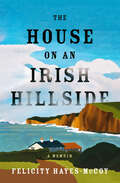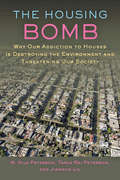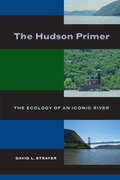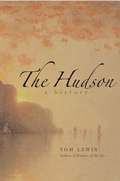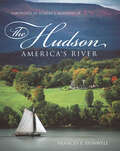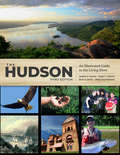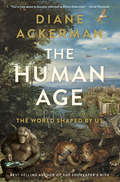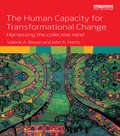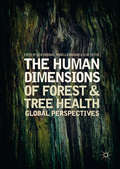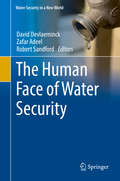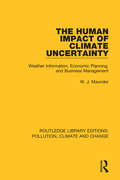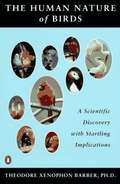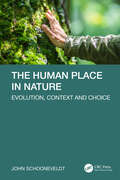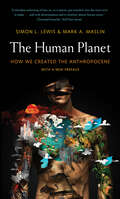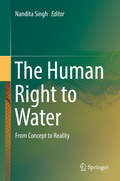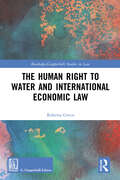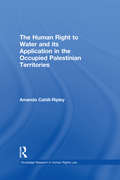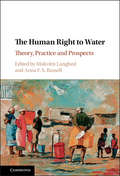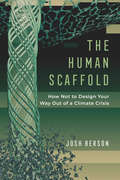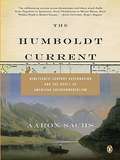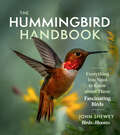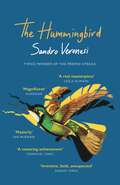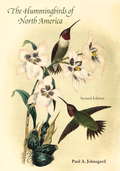- Table View
- List View
The House Without Windows
by Barbara Newhall FollettEscape into the wild from the comfort of your own home this winter, with a dazzling lost classic of nature writing... Eepersip is a girl with the wild in her heart. She does not want to live locked up behind the walls of a house. So she runs away - first to the Meadow, then to the Sea, and finally to the Mountain. Her heartbroken parents follow their daughter, trying to bring her home safe, but Eepersip has other ideas...Republished by Penguin with a new introduction and hand-inked illustrations by beloved artist Jackie Morris, The House Without Windows is a timeless fable about wildness, freedom and the redemptive power of the natural world.'I can safely promise joy to any reader of The House Without Windows. Perfection' Eleanor Farjeon, winner of the Carnegie Medal and The Hans Christian Andersen Award 'Gloriously illuminated by Jackie Morris's moving art, this is a work of strange power for our own bewildered times' Nick Drake 'A classic, as miraculous and awe-inspiring as the author' Xinran, author of The Good Women of China
The House on an Irish Hillside: A Memoir
by Felicity Hayes-McCoy&“A lovely writer, far superior to the average memoirist. . . . A curious mind, a perceptive observer with an artist&’s eye, a seeker of truth and beauty.&” —Irish IndependentFrom the moment I crossed the mountain, I fell in love with the place, which was more beautiful than any I&’d ever seen. And with a way of looking at life that was deeper, richer and wiser than any I&’d known before. . . . From the first day I came here I always knew I&’d come back. Sometimes we have to go back to our beginnings to become the person we want to be. More than a decade ago, USA Today–bestselling author Felicity Hayes-McCoy left the hectic pace of London and returned to her home country of Ireland to forge a new life in a remarkable house on the stunning Dingle peninsula. Gorgeously written, this is a life-affirming tale of rediscovering lost values and remembering the things that matter most. &“Wise, funny and touching, this book is a portrait of friendships, customs and folklore of Ireland; but what stays with you is harder to catch, like smoke or running water. It is the taste of something we all once knew, ever-present if only you look for it.&” ―Joanna Lumley, actress and author of Absolutely: A Memoir &“The book glowed . . . when I finished reading, I felt a sense of well-being, wonder and delight.&” —Alice Taylor, bestselling author of To School Through the FieldsPraise for Felicity Hayes-McCoy &“A pitch-perfect delight.&” —Marian Keyes, international bestselling author of Grown Ups on The Transatlantic Book Club &“The spot-on descriptions of Ireland&’s country roads and expansive sky all but leap off the page. . . . Maeve Binchy and Patrick Taylor fans will find much to enjoy.&” —Booklist on The Library at the Edge of the World &“Sunshine on the page.&” —Cathy Kelly, bestselling author of Between Sisters on The Month of Borrowed Dreams
The Housing Bomb: Why Our Addiction to Houses Is Destroying the Environment and Threatening Our Society
by Jianguo Liu M. Nils Peterson Tarla PetersonHow our thirst for more and larger houses is undermining society and what we can do about it.Have we built our way to ruin? Is your desire for that beach house or cabin in the woods part of the environmental crisis? Do you really need a bigger home? Why don’t multiple generations still live under one roof? In The Housing Bomb, leading environmental researchers M. Nils Peterson, Tarla Rai Peterson, and Jianguo Liu sound the alarm, explaining how and why our growing addiction to houses has taken the humble American dream and twisted it into an environmental and societal nightmare. Without realizing how much a contemporary home already contributes to environmental destruction, most of us want bigger and bigger houses and dream of the day when we own not just one dwelling but at least the two our neighbor does. We push our children to "get out on their own" long before they need to, creating a second household where previously one existed. We pave and build, demolishing habitat needed by threatened and endangered species, adding to the mounting burden of global climate change, and sucking away resources much better applied to pressing societal needs. "Reduce, reuse, recycle" is seldom evoked in the housing world, where economists predict financial disasters when "new housing starts" decline and the idea of renovating inner city residences is regarded as merely a good cause. Presenting irrefutable evidence, this book cries out for America and the world to intervene by making simple changes in our household energy and water usage and by supporting municipal, state, national, and international policies to counter this devastation and overuse of resources. It offers a way out of the mess we are creating and envisions a future where we all live comfortable, nondestructive lives. The "housing bomb" is ticking, and our choice is clear—change our approach or feel the blast.
The Hudson Primer: The Ecology of an Iconic River
by David L. StrayerThis succinct book gives an intimate view of the day-to-day functioning of a remarkable river that has figured prominently in history and culture--the Hudson, a main artery connecting New York, America, and the world. Writing for a wide audience, David Strayer distills the large body of scientific information about the river into a non-technical overview of its ecology. Strayer describes the geography and geology of the Hudson and its basin, the properties of water and its movements in the river, water chemistry, and the river's plants and animals. He then takes a more detailed look at the Hudson's ecosystems and each of its major habitats. Strayer also discusses important management challenges facing the river today, including pollution, habitat destruction, overfishing, invasive species, and ecological restoration.
The Hudson: A History
by Tom LewisThe Hudson River has always played a vital role in American culture. Flowing through a valley of sublime scenery, the great river uniquely connects America's past with its present and future. This book traces the course of the river through four centuries, recounting the stories of explorers and traders, artists and writers, entrepreneurs and industrialists, ecologists and preservationists-those who have been shaped by the river as well as those who have helped shape it. Their compelling narratives attest to the Hudson River's distinctive place in American history and the American imagination. Among those who have figured in the history of the Hudson are Benedict Arnold, Alexander Hamilton, Franklin and Eleanor Roosevelt, the Astors and the Vanderbilts, and Thomas Cole of the Hudson River school. Their stories appear here, alongside those of such less famous individuals as the surveyor who found the source of the Hudson and the engineer who tried to build a hydroelectric plant at Storm King Mountain. Inviting us to view the river from a wider perspective than ever before, this entertaining and enlightening book is worthy of its grand subject.
The Hudson: America's River
by Frances DunwellFrances F. Dunwell presents a rich portrait of the Hudson and of the visionary people whose deep relationship with the river inspires changes in American history and culture. Lavishly illustrated with color plates of Hudson River School paintings, period engravings, and glass plate photography, The Hudson captures the spirit of the river through the eyes of its many admirers. It shows the crucial role of the Hudson in the shaping of Manhattan, the rise of the Empire State, and the trajectory of world trade and global politics, as well as the river's influence on art and architecture, engineering, and conservation.
The Hudson: America's River
by Frances F. Dunwell&“A commanding and inspiring biography of a river that gave rise to an art movement, progressive social quests, [and] landmark environmental cases.&” —Booklist (starred review) Includes maps, photos, and illustrations Frances F. Dunwell presents a rich portrait of the Hudson and of the visionary people whose deep relationship with the river inspired changes in American history and culture. Lavishly illustrated with color plates of Hudson River School paintings, period engravings, and glass plate photography, The Hudson captures the spirit of the river through the eyes of its many admirers. It reveals the crucial role of the Hudson in the shaping of Manhattan, the rise of the Empire State, and the trajectory of world trade and global politics, as well as the river&’s influence on art and architecture, engineering, and conservation. &“A story of interaction between people and the environment and a story of continuing inspiration and renewal.&” —Library Journal
The Hudson: An Illustrated Guide to the Living River
by Stephen P. Stanne Roger G. Panetta Brian E. Forist Maija Liisa NiemistoSince 1996, The Hudson: An Illustrated Guide to the Living River has been an essential resource for understanding the full sweep of the great river's natural history and human heritage. This updated third edition includes the latest information about the ongoing fight against pollution and environmental damage to the river, plus vibrant new full-color illustrations showing the plants and wildlife that make this ecosystem so special. This volume gives a detailed account of the Hudson River’s history, including the geological forces that created it, the various peoples who have lived on its banks, and the great works of art it has inspired. It also showcases the many species making a home on this waterway, including the Atlantic sturgeon, the bald eagle, the invasive zebra mussel, and the herons of New York Harbor. Combining both scientific and historical perspectives, this book demonstrates why the Hudson and its valley have been so central to the environmental movement. As it charts the progress made towards restoring the river ecosystem and the effects of emerging threats like climate change, The Hudson identifies concrete ways that readers can help. To that end, royalties from the sale of this book will go to the non-profit environmental advocacy group Hudson River Sloop Clearwater, Inc.
The Human Age: The World Shaped By Us
by Diane AckermanAs Diane Ackerman writes in her brilliant new book, The Human Age, "our relationship with nature has changed...radically, irreversibly, but by no means all for the bad. Our new epoch is laced with invention. Our mistakes are legion, but our talent is immeasurable." Ackerman is justly celebrated for her unique insight into the natural world and our place in it. In this landmark book, she confronts the unprecedented reality that one prodigiously intelligent and meddlesome creature, Homo sapiens, is now the dominant force shaping the future of planet Earth. Humans have "subdued 75 percent of the land surface, concocted a wizardry of industrial and medical marvels, strung lights all across the darkness." We tinker with nature at every opportunity; we garden the planet with our preferred species of plants and animals, many of them invasive; and we have even altered the climate, threatening our own extinction. Yet we reckon with our own destructive capabilities in extraordinary acts of hope-filled creativity: we collect the DNA of vanishing species in a "frozen ark," equip orangutans with iPads, and create wearable technologies and synthetic species that might one day outsmart us. With her distinctive gift for making scientific discovery intelligible to the layperson, Ackerman takes us on an exhilarating journey through our new reality, introducing us to many of the people and ideas now creating--perhaps saving--our future and that of our fellow creatures. A beguiling, optimistic engagement with the changes affecting every part of our lives, The Human Age is a wise and beautiful book that will astound, delight, and inform intelligent life for a long time to come.
The Human Capacity for Transformational Change: Harnessing the collective mind
by Valerie A. Brown John A. HarrisPressures for transformational change have become a regular feature of most fields of human endeavour. Master-thinkers and visionaries alike have reframed existing divisions as connecting relationships, bringing together as dynamic systems the supposed opposites of parts and wholes, stability and change, individuals and society, and rational and creative thinking. This reframing of opposites as interconnected wholes has led to realisation of the power of a collective mind.This book offers ways and means of creating the synergies that are crucial in influencing a desired transformational change towards a just and sustainable future. It describes how and why our current decision-making on any complex issue is marked by clashes between the different interests involved. More optimistically, the book pursues a mode of thinking that brings together government, specialised and community interests at the local, regional and personal scales in a collective transformation process. Practical examples signal the emergence of a new knowledge tradition that promises to be as powerful as the scientific enlightenment. Written in accessible language, this book will be insightful reading for anyone struggling with transformational change, especially researchers, students and professionals in the fields of administration, governance, environmental management, international development, politics, public health, public law, sociology, and community development
The Human Dimensions of Forest and Tree Health: Global Perspectives
by Clive Potter Julie Urquhart Mariella MarzanoThis book explores the specifically human dimensions of the problem posed by a new generation of invasive pests and pathogens to tree health worldwide. The growth in global trade and transportation in recent decades, along with climate change, is allowing invasive pests and pathogens to establish in new environments, with profound consequences for the ecosystem services provided by trees and forests, and impacts on human wellbeing. The central theme of the book is to consider the role that social science can play in better understanding the social, economic and environmental impacts of such tree disease and pest outbreaks. Contributions include explorations of how pest outbreaks are socially constructed, drawing on the historical, cultural, social and situated contexts of outbreaks; the governance and economics of tree health for informing policy and decision-making; stakeholder engagement and communication tools; along with more philosophical approaches that draw on environmental ethics to consider ‘non-human’ perspectives. Taken together the book makes theoretical, methodological and applied contributions to our understanding of this important subject area and encourages researchers from across the social sciences and humanities to bring their own disciplinary perspectives and expertise to address the complexity that is the human dimensions of forest and tree health.Chapters 5 and 11 are open access under a CC BY 4.0 license via link.springer.com.
The Human Face of Water Security
by Zafar Adeel David Devlaeminck Robert SandfordThis volume collects essays from academics and practitioners from a diversity of areas and perspectives in order to discuss water security at various levels and to illuminate the central idea of water security: its focus on the individual. Beginning with the big picture, this book aims to illustrate the depth of the water security crisis and its interconnections with other aspects of societal development. It particularly draws a connection to the 2030 Agenda for Sustainable Development, and discusses that challenges faced in meeting the 17 sustainability development goals (SDG) by the year 2030. Moving from international to domestic and community perspectives, this book provides a unique analysis of issues and solutions to the water issues we face today in light of the ever looming global changes brought on by climate change. Over the past few decades the recognition of our common need for water has increased, as policymakers have sought to place more focus on the individual within policy. After the recognition of water and sanitation as a fundamental human right by the United Nations General Assembly in 2010, there is increasing recognition of the individual as the building block for the struggle for water security. This reality also intersects with adverse impacts of global climate change, and the book responds to the broader question: will clean and safe water be available where we need it and when we need it in the future?
The Human Impact of Climate Uncertainty: Weather Information, Economic Planning, and Business Management
by W. J. MaunderOriginally published in 1989, this book provides an overview of the economic dimensions of climate and human activities, and considers how the variable nature of the atmosphere must be accepted as an integral part of the management package. It discusses how climatic repercussions can hold major importance for international politics, particularly in the light of the impacts of climatic changes induced by greenhouse gases.
The Human Nature of Birds: A Scientific Discovery with Startling Implications
by Theodore X. BarberA provocative new study of birds, humans, and the deepest prejudices of Western science--developed from six years of independent research by a behavioral scientist. In the spirit of the New York Times bestseller The Hidden Life of Dogs. Color photos.
The Human Place in Nature: Evolution, Context and Choice
by John SchooneveldtThis book explores a new approach to understanding the evolution of mind and consciousness by examining the perceptual abilities of animals and the way they experience their world. It offers a science-based bottom-up approach to our own conscious worldview by seeing it through the eyes of others. Emphasis is on the role of context in evolution and the way animals internalize and engage with the contextual properties of their world that are meaningful for them. The core argument is that a context, which is subjective and comprised of the perceptual capacities, offers new insights into the evolution of mind. Rather than seeing biological evolution in terms of the emergence of mindless forms and cultural evolution as the emergence of disembodied minds, the book seeks to integrate these two perspectives through the rigorous mapping of contexts.Key Features Reveals an understanding of animal minds Formulates a hypothesis for the evolution of consciousness Includes a discussion of the origin of technological innovation Provides a rationale for the ecology of mind Proposes a theory of the evolution of language Outlines the science of experience and how it influences choice Explains the role of context and choice with respect especially to human ecology
The Human Planet: How We Created the Anthropocene
by Mark A. Maslin Simon L. LewisAn exploration of the Anthropocene and “a relentless reckoning of how we, as a species, got ourselves into the mess we’re in today” (The Wall Street Journal).Meteorites, mega-volcanoes, and plate tectonics—the old forces of nature—have transformed Earth for millions of years. They are now joined by a new geological force—humans. Our actions have driven Earth into a new geological epoch, the Anthropocene. For the first time in our home planet's 4.5-billion-year history a single species is increasingly dictating Earth’s future.To some the Anthropocene symbolizes a future of superlative control of our environment. To others it is the height of hubris, the illusion of our mastery over nature. Whatever your view, just below the surface of this odd-sounding scientific word—the Anthropocene—is a heady mix of science, philosophy, history, and politics linked to our deepest fears and utopian visions.Tracing our environmental impacts through time, scientists Simon Lewis and Mark Maslin reveal a new view of human history and a new outlook for the future of humanity in the unstable world we have created.
The Human Right to Water
by Nandita SinghThe discourse on the human right to water presents deliberations on the concept, content and rationale for the right, with little attention to the practical question of translating the right into reality. This book aims to fill this void by focusing on 'realization' of the right by its holders, examining how effective the mechanisms are for 'implementing' the right in enabling its universal realization. In a quest to answer this question, the book draws a conceptual differentiation between 'implementation' and 'realization' of the right, arguing that unlike implementation - which is an objective process of creation and implementation of measures such as legal frameworks, institutional structures or policy and action guidelines, realization of the right is a subjective process that extends much beyond. It takes shape within specific contextual settings which may include varied situations, yet remains neglected in the related academic and action forums. This book attempts to address this void by discussing some of the most significant contexts and the underlying problems and concerns that strongly influence realization of the human right to water. It contends that if the right is to be truly realized, these different contexts - which can be further classified as 'objective' and 'subjective' - must be understood, analysed and appropriately addressed before framing and implementing relevant action. The book further situates the human right to water discourse in a broader interdisciplinary perspective, expanding its scope beyond the narrower legal dimensions, linking it to the wider field of water resources management/governance. Through the novel ideas it proposes, the book makes an innovative and unique contribution in the field of human right to water which is of great scientific value.
The Human Right to Water and International Economic Law (Routledge-Giappichelli Studies in Law)
by Roberta GrecoThis book discusses the international right to water and the liberalization of water services. It is concerned with the harmonization of the right to water with the legal systems under which liberalization of water services has taken or may take place. It assesses paths of harmonization between international human rights law and international economic law in this specific field. The issue of the compatibility between the fulfilment of the right to water and the liberalization of water services has been at the heart of a passionate public debate between opponents and advocates of the privatization of the utility. The book provides an unbiased analysis of different international legal regimes under which the liberalization of water services has occurred or is likely to occur, notably international investment law, international trade law and European Union law, in order to assess whether the main features of the right to water can be guaranteed under each of these systems of law and whether there is space for prospective harmonization. The work will be an invaluable resource for academics, researchers and policy-makers working in the areas of International Human Rights Law, International Economic Law, International Water Law, International Trade Law and EU Law.
The Human Right to Water and its Application in the Occupied Palestinian Territories (Routledge Research in Human Rights Law)
by Amanda Cahill RipleyThe Human Right to Water and Its Application in the Occupied Palestinian Territories provides an overview and examination of the human right to water as determined under international human rights law. This is a highly topical issue, with the UN General Assembly having passed a resolution which declares access to clean water and sanitation a human right (New York, Jul 28 2010), the recent appointment of the UN Independent Expert on the issue of human rights obligations related to access to safe drinking water and sanitation, and movement within the NGO community for an international water treaty. Amanda Cahill Ripley analyses the current legal status, substantive content, and obligations correlative to the right, and examines the relationship between other economic, social and cultural rights related to the right to water. The book goes on to look more specifically at the application of the human right to water in the Occupied Palestinian Territories. Using innovative methodology, Cahill Ripley combines legal analysis with a qualitative social science empirical case study to explore the enjoyment of the right ‘on the ground’. The wider implications of the case study findings are then considered, looking at what can be done to strengthen the right legally in terms of its status and codification, and what remedy can be found for violations of the right, both specifically in the Occupied Palestinian Territories and in a more general context. The book will be of interest to students, academics and practitioners within the fields of international human rights law and international humanitarian law, as well as those concerned with international relations and conflict resolution within Israel/Palestine and the wider Middle East region.
The Human Right to Water: Theory, Practice and Prospects
by Russell Malcolm Langford Anna F. S.In a short space of time, the right to water has emerged from relative obscurity to claim a prominent place in human rights theory and practice. This book explores this rise descriptively and prescriptively. It analyses the recognition, use and partly impact, of the right to water in international and comparative law, civil society mobilisation and public policy. It also scrutinises the normative implications of the right to water with a focus on challenges and puzzles it creates for law and policymaking. These questions are explored globally and comparatively within different dynamics of the sector - water allocation, water access and urban and rural water reform - and in conjunction with the right to sanitation. This multi-disciplinary volume reveals the diverse ways in which the right to water has been adopted, but also its limitations when faced with the realities of political economy, political ecology and partly, traditional legal thought.
The Human Scaffold: How Not to Design Your Way Out of a Climate Crisis (Great Transformations #2)
by Josh BersonHumanity has precipitated a planetary crisis of resource consumption—a crisis of stuff. So ingrained is our stuff-centric view that we can barely imagine a way out beyond substituting a new portmanteau of material things for the one we have today.In The Human Scaffold, anthropologist Josh Berson offers a new theory of adaptation to environmental change. Drawing on niche construction, evolutionary game theory, and the enactive view of cognition, Berson considers cases in the archaeology of adaptation in which technology in the conventional sense was virtually absent. Far from representing anomalies, these cases exemplify an enduring feature of human behavior that has implications for our own fate.The time has come to ask what the environmental crisis demands of us not as consumers but as biological beings. The Human Scaffold offers a starting point.
The Humboldt Current
by Aaron SachsWhile everyone has heard of the 'Humboldt Current', few know anything of the man after whom it was named. Yet Alexander von Humboldt was a towering figure of his time - scientist, explorer, and polymath, imbued with Enlightenment ideas - and he left a profound impact on the intellectual life of 19th century America. Aaron Sachs' colourful intellectual history rescues Humboldt from obscurity, and reveals the impact of a single European on both American thought and the environmental movement. Aaron Sachs traces Humboldt's legacy by focusing not only on the man himself but on the lives of other remarkable individuals who took their lead from him - explorers of the American mid-West, alienated Romantics, seminal American writers and artists, who together laid the groundwork for the great ecological tradition in 19th century America.
The Hummingbird Handbook: Everything You Need to Know about These Fascinating Birds
by John SheweyEverything you need to know about these fascinating birds Hummingbirds inspire an unmistakable sense of devotion and awe among bird lovers. Gardeners, too, love the company of hummingbirds, not only for their beauty, but also for their role as pollinators. Brimming with astonishing facts, practical advice, and important ecological information, The Hummingbird Handbook is a must-have guide to attracting, understanding, and protecting hummingbirds. From advice on feeders to planting and landscaping techniques that will have your garden whirring with tiny wings, lifelong birder John Shewey provides all you need to know to entice these delightful creatures. An identification guide makes them easy to spot in the wild, with stunning photographs, details on plumage variations, and range maps showing habitats and migration patterns. Need more joy in your life? Let this guide and nature&’s aerial jewels help you create a lively haven.
The Hummingbird: ‘Magnificent’ (Guardian)
by Sandro VeronesiA BOOK OF THE YEAR FOR THE GUARDIAN: 'DEEPLY PLEASURABLE'A BOOK OF THE YEAR FOR THE SPECTATOR: 'WHAT A JOY''Magnificent' Guardian'A towering achivement' Financial Times'Inventive, bold, unexpected' Sunday Times'Everything that makes the novel worthwhile and engaging is here: warmth, wit, intelligence, love, death, high seriousness, low comedy, philosophy, subtle personal relationships and the complex interior life of human beings'Guardian'Not since William Boyd's Any Human Heart has a novel captured the feast and famine nature of a single life with such invention and tenderness'Financial Times'There is a pleasing sense of having grappled with the real stuff of life: loss, grief, love, desire, pain, uncertainty, confusion, joy, despair - all while having fun'The Sunday Times'Instantly immersive, playfully inventive, effortlessly wise'Observer'Masterly: a cabinet of curiosities and delights, packed with small wonders'Ian McEwan'A real masterpiece. A funny, touching, profound book that made me cry like a little girl on the last page'Leïla Slimani'A remarkable accomplishment, a true gift to the world'Michael Cunningham'Ardent, gripping, and inventive to the core'Jhumpa LahiriMarco Carrera is 'the hummingbird,' a man with the almost supernatural ability to stay still as the world around him continues to change.As he navigates the challenges of life - confronting the death of his sister and the absence of his brother; taking care of his parents as they approach the end of their lives; raising his granddaughter when her mother, Marco's own child, can no longer be there for her; coming to terms with his love for the enigmatic Luisa - Marco Carrera comes to represent the quiet heroism that pervades so much of our everyday existence.A thrilling novel about the need to look to the future with hope and live with intensity to the very end.THE NO. 1 INTERNATIONAL BESTSELLEROver 300,000 copies soldSoon to be a major motion pictureWinner of the Premio StregaWinner of the Prix du Livre EtrangerBook of the Year for the Corriere della Sera
The Hummingbirds of North America, Second Edition
by Paul A. JohnsgardSwift and iridescent, hummingbirds are found only in the New World, and encompass an amazing variety of specializations. No other family of birds can lay claim to so many superlatives, including smallest size, most rapid wingbeat, and most specialized plumages. While many species can be attracted to feeding stations and backyard flower gardens, others can be found only in the wild.Paul A. Johnsgard's Hummingbirds of North America is the only book devoted to the identification, distribution, and biology -- both individual and comparative -- of all hummingbirds that breed in North America. First published in 1983, this acclaimed volume now has been revised and expanded to include twenty-five Mexican species, such as the long-billed starthroat and the fork-tailed emeralds, thereby more than doubling the species coverage of the original edition. Full species-by-species accounts survey the evolutionary history, anatomical and physiological specializations, and comparative ecology, behavior, and reproductive biology of this largest family of nonpasserine birds. Individual accounts are complemented by 24 full-color paintings.Including updated range maps, identification keys, and a bibliography that has been broadened to include literature on the little-known Mexican species, the book is both accessible to amateur birders and an authoritative volume for ornithologists.

